Procurement
Achieving efficient and stable procurement operations by leveraging economies of scale and an international network
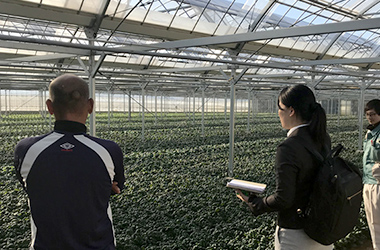
Taking advantage of the economies of scale afforded by Skylark Group’s network of approximately 3,100 stores, our buyers procure ingredients that meet exacting quality standards at optimal prices, from producers around the world.
Although our suppliers are located in some 40 countries around the globe, we are able to minimize the impact of exchange rate fluctuations. When market prices for particular ingredients rise, we devise ways of avoiding decreases in the value we deliver to customers by considering measures utilizing our global network of suppliers, such as in changing production locations or revising contract periods and/or amounts.
When selecting suppliers, we check not only financial reliability and consistency of quality but also employee management by business partners (ensuring occupational safety and health), consideration for human rights (preventing child labor, forced labor, discrimination and long working hours; right to freedom of association, collective bargaining), consideration for the environment (conserving energy, mitigating climate change, protecting water resources and biodiversity, reducing food loss, and using resources efficiently), and other antisocial activities. We prioritize the selection of business partners who are fulfilling their responsibilities to society.
Reducing cost prices is another key mission.
To ensure that our buyers are able to leverage economies of scale to procure ingredients at optimal best prices, we have developed a buyer training program and launched a cost optimization project in coordination with multiple departments including our production and menu development divisions, which we work to improve each year.
Sustainability “Supply Chain”
Production
Consistently achieving high quality through ingredient management and primary processing at our ten central kitchens located across Japan
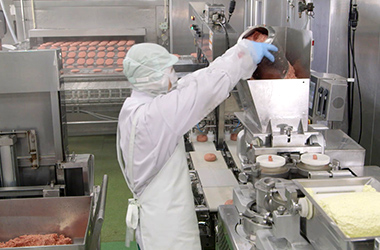
Our ten central kitchens, located throughout Japan, centralize food preparation tasks such as the cutting of ingredients and preparation of in-house sauces. In doing so, they reduce in-store food preparation tasks at each restaurant and enable the consistent provision of high-quality products. They eliminate surplus inventory by preparing only what each restaurant orders the night before. Preparing only what is needed on a daily basis also contributes to lowering storage costs.
Primary processing at our central kitchens makes use of a combination of automatic and manual work, entrusting each with the tasks they are best suited for rather than depending solely on one or the other. This has enabled us to develop a system that can respond flexibly to seasonal menu changes, openings of new types of restaurants, and development of new menu items. It also enables us to open diverse types of restaurants in all manner of locations.
Development of technologies for offering highly processed products and reducing the need for in-store preparation
To increase our level of customer service even further, we are moving forward with the development of technologies that enable us to offer more highly processed products, by having our central kitchens perform part of the preparation work to reduce the growing complexity of preparation at our in-store kitchens. By reducing the amount of food preparation performed in-store, our aim is not only to enable restaurant employees to devote more attention to floor service but also increase customer satisfaction by offering dishes prepared through complex cooking procedures. Serving high value-added menu items with consistently high quality can lead to increases in both sales and guest count.
Development of frozen food products for our new e-commerce business
In November 2020, we entered the e-commerce business in order to cater to consumer lifestyles which have changed as a result of the COVID-19 pandemic. We have begun development of frozen versions on popular products such as Bamiyan's gyoza dumplings, to enable customers to enjoy the same taste as in our restaurants at home. From 2021 onward, we plan to gradually expand our product lineup manufactured in-house.
Logistics
Our own group-wide logistics network enables reduction of CO2 emissions
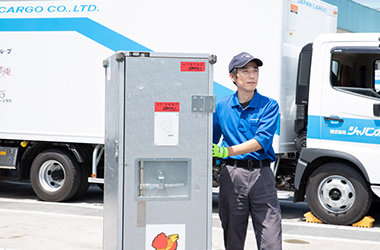
Products prepared at our central kitchens are delivered fresh and at appropriate temperatures to our stores nationwide. Since 2014, we have worked to optimize our distribution systems. Transitioning from the past business-type/brand-based delivery approach to one that is area-specific has enabled optimal and efficient delivery of products to multiple restaurants and stores of different brand or business-type within the same area. This in-house distribution network supports our 3,100 stores nationwide.
Optimizing distribution in this way has allowed us to greatly reduce the number of trucks we use and the distances they travel. At the same time, it has benefited the global environment, such as by reducing CO2 emissions. In order to further improve logistics efficiency, we are now conducting tests such as changing deliveries from seven days a week to six, and working to continuously reduce CO2 emissions.
Food Preparation and Customer Service
Providing consistently high quality through thoroughly standardized operations at restaurants nationwide
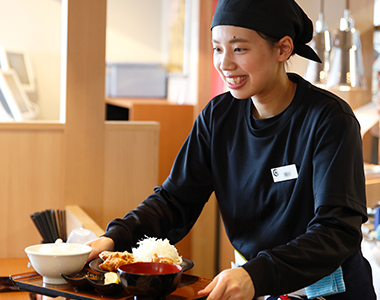
Service Standardization
Skylark Group emphasizes thorough operational standardization, so that we can offer the same high quality and services at all of our restaurants and stores throughout Japan. Creating a system for enabling efficient operations with consistent time and food management standards for preparation and customer service has eliminated deviations in value provided and enabled us to provide customers with consistently high quality. In addition, uniform hygiene standards and a personnel system that is the same across the Group results in consistent service even when or employees are transferred to other posts.
Employee Training
From the time they join the Skylark Group, all employees undergo training aimed at understanding of safety and hygiene, our code of conduct, and other aspects of what it means to be part of the Skylark family.
Inspection
ISO22000 certification
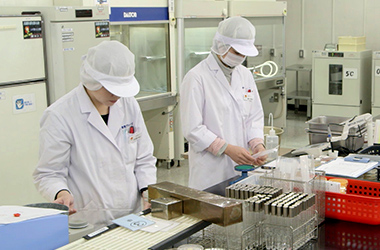
Skylark has established quality control groups at eight locations throughout Japan. The Group has obtained ISO22000 international food safety management standard certification, covering all ten of its factories in Japan, as well as its purchasing division responsible for procurement, menu development division, quality control division, and internal auditing division.
By adding purchasing and menu development divisions to the list of departments covered by this certification, we can extend confirmation of the validity and appropriateness of food safety management systems by our suppliers and food preparation procedures at our restaurants. In this way, we are building a food management system that is integrated with our supply chain.
With regard to ingredients in the food it provides, Skylark Group has established a Quality Charter to respond to all foreseeable food-related risks in every supply chain process, from procurement of raw ingredients through processing, distribution, storage, and provision of food to customers.
The Group also performs precise, swift, unannounced inspections of all processes, examining traceability and hygienic handling, anticipating hazards such as bacterial and viral food poisoning, and contamination by unspecified allergens, agrichemicals and foreign objects.